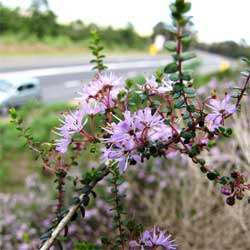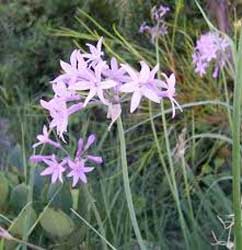
Top stories






More news


Marketing & Media
Ads are coming to AI. Does that really have to be such a bad thing?














The South African National Roads Agency (Sanral) has come under fire from Cape Nature in the Western Cape for failing to manage thousands of kilometres of road reserve that is home to precious plant species.
But Sanral official Mpati Makoa said it was committed to protecting rare species on road reserves, the outer edges of the road corridors.
Cape Nature claimed Sanral workers mowed a rare Cape plant, Agathosma orbicularis, a type of buchu - until recently thought to be extinct - that was growing in a clump next to the N2 highway outside Caledon.
The plant grew back, but conservation officials fear it will not survive another round under the scythe.
"Nobody could find it for about 20 years," said Cape Nature botanist Rupert Koopman of the purple-flowering plant, but then it was rediscovered on the side of the national road.
"Other affected species included wild garlic, a little-known cone bush and the world's smallest protea," said Koopman.
"Another affected area was the N9 between George and Colesberg, where road maintenance teams had destroyed rare and protected aloe species," said botanist Cameron McMaster. Instead of ring-fencing sensitive floral areas, Sanral is mowing everything, according to botanists.
"In the 1980s the road reserves were amazing," said Koopman. "Now we are losing biodiversity."

Some fynbos species of the Western Cape occur only tiny pockets on mountain slopes or valleys and are easily destroyed. Road and railway reserves are the only areas left for natural vegetation in some farming areas.
Botanists said the government had a duty to protect endangered species in terms of its international obligations. About a quarter of South Africa's plants either faced extinction or were classed as "of conservation concern".
"Many of the plants that are being destroyed in this way are listed red-data species that are highly protected by our nature conservation ordinances," said McMaster, a member of botanical watchdog group Custodians of Rare and Endangered Wild Flowers.
"If anyone were to pick roadside flowers or dig out any of these protected plants, they would be committing a serious crime and be liable for prosecution with severe penalties. Yet the road maintenance crews can do so with impunity," he said.
Makoa, who is Sanral's environmental manager, conceded that mistakes did occur in the course of routine road maintenance activities.
"These are usually pointed out by knowledgeable individuals who often advise and/or partner with Sanral to ensure improvements are made.
"The prior identification of existing alien vegetation for clearing and/or vegetation of conservation value, coupled with training of maintenance contractors, is important and provided for in our road reserve management guideline," he said.
Source: Sunday Times via I-Net Bridge